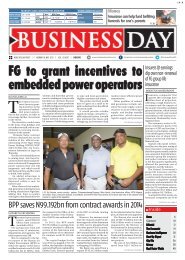Create successful ePaper yourself
Turn your PDF publications into a flip-book with our unique Google optimized e-Paper software.
THE NATION TUESDAY, APRIL 28, 2015<br />
27<br />
LAW & SOCIETY<br />
•Chief Judge of Lagos State, Justice Olufunmilayo Atilade.<br />
IT started with Magistrate O.O.<br />
Martins of Lagos Magistrates‘<br />
Court, Igbosere in 2012, who, on<br />
several occasions, walked reporters<br />
out of her courtroom for no reason.<br />
At first, journalists thought it was<br />
probably because the cases in question<br />
were among those for exemption<br />
as provided for in Section 36(4)<br />
of the 1999 Constitution and as such,<br />
obeyed her directive.<br />
Unfortunately, that was not the<br />
case as the Magistrate one morning<br />
openly said: “I don’t want reporters<br />
in my court,” irrespective<br />
of the fact that the cases she handles<br />
neither jeopardise state security,<br />
involve minors, nor endanger<br />
public health.<br />
This reporter decided to confirm<br />
the complaints from her colleagues<br />
who she had chased out before<br />
from her courtroom.<br />
So, that fateful morning in 2012,<br />
she was among the first callers at<br />
the court and quietly sat on the last<br />
bench awaiting the arrival of Magistrate<br />
Martins to commence the<br />
day’s proceeding.<br />
•Continued from page 26<br />
of an academic lawyer, but he had<br />
world reputation. Then we had Justice<br />
Nnamani who was Attorney-<br />
General and then became a justice<br />
of the Supreme Court. Those are<br />
very exceptional cases. Don’t make<br />
it a norm. There could be exceptional<br />
cases. But it’s not to make<br />
those outside to rank pari-pasu<br />
with those who are already there.<br />
Look for the best. For all I know<br />
it’s not just about mere advocacy. I<br />
was a practitioner. I got to the<br />
Bench and found it was different. I<br />
found that I had to look at the cases<br />
with detached mind. So it’s not the<br />
same.<br />
What is your advice on<br />
how to do justice?<br />
My advice simply is this: Always<br />
remember your judicial oath. Be<br />
industrious. There is no need for<br />
you to sit late. Your training at the<br />
Law School enjoins you to be<br />
prompt. If you’re a practitioner and<br />
you’re late in going to court, your<br />
client one day will go and look for<br />
another lawyer. Sit on time; do<br />
your best when you’re there; always<br />
remember your judicial oath.<br />
Minimise your social outings because<br />
the work is so demanding.<br />
You’re not going to look at the case<br />
of one side; you’re going to look at<br />
the two cases, and on your own,<br />
look at similar cases that had happened<br />
in the past that could assist<br />
Judges and magistrates have barred journalists from covering some cases, including<br />
those considered to be in the public interest. A recent example involved Justice Aishat<br />
Opesanwo, who walked journalists out during a robbery trial. Are such cases supposed<br />
to be heard in ‘private?’ PRECIOUS IGBONWELUNDU asks.<br />
When judges, magistrates<br />
turned against journalists<br />
As soon as she came in and was<br />
about to start taking matters, one<br />
of her support staff walked up to<br />
her and whispered something in<br />
her ear.<br />
The look on Martins’ face was<br />
anything, but unpleasant as she<br />
yelled: “I have said it severally that<br />
I do not want journalists in my<br />
court. What are you doing here?<br />
Get out of this place and let no reporter<br />
ever come to this court<br />
again.”<br />
Seeing her so enraged, the reporter<br />
quietly, but angrily left her<br />
court and never went there again<br />
till date.<br />
As if that was not enough, a High<br />
Court Judge, Justice Aishat<br />
Opesanwo, last week banned reporters<br />
from covering a murder<br />
trial in her courtroom on grounds<br />
that “it is a private matter.”<br />
Unlike Magistrate Martins, Justice<br />
Opesanwo was calm as she told the<br />
three female reporters seated at the<br />
gallery to leave the court because<br />
they were not needed.<br />
Aside the two examples personally<br />
witnessed, incidences abound<br />
where reporters have reportedly<br />
been humiliated and sent out of<br />
courtrooms by judicial officers in<br />
outright violation of the constitution,<br />
which clearly categorises a<br />
court as a public place.<br />
As if to borrow a leave from their<br />
learned brothers on the Bench, instances<br />
abound where some lawyers,<br />
who came late to court and<br />
could not secure seats at the Bar,<br />
have asked reporters to vacate their<br />
seats at the gallery for them.<br />
There was a particular case at the<br />
Federal High Court, Lagos, before<br />
Justice Ajumogobia, where a latecomer<br />
lawyer tapped a reporter on<br />
his shoulder and said “get up I want<br />
to sit down.”<br />
Initially, the reporter ignored him<br />
thinking he would respect himself<br />
and leave, but when he persisted,<br />
the angry reporter scolded him to<br />
the hearing of the judge, who also<br />
reprimanded the lawyer.<br />
However, most reporters have expressed<br />
worries over this cold war<br />
or seeming disdain for them by judicial<br />
officers, who see their presence<br />
in courts as intruding rather<br />
than fulfilling their constitutional<br />
obligations.<br />
Some have wondered whether the<br />
actions of the judicial officers were<br />
as a result of sheer ignorance of the<br />
law or because they have skeletons<br />
in their cupboards, which they do<br />
not want the journalists to uncover.<br />
They are worried that as custodians<br />
of the law, judicial officers who<br />
should, at all times, uphold the constitution,<br />
have turned to lawbreakers.<br />
What the law says<br />
The Constitution in Section 36 (3)<br />
expressly classified a court as a public<br />
place and went further in 36 (4)<br />
to state thus: “whenever any person<br />
is charged with a criminal offence,<br />
he shall, unless the charge is<br />
withdrawn, be entitled to a fair<br />
hearing in public within a reasonable<br />
time by a court or tribunal.<br />
“Provided that (a) a court or such<br />
tribunal may exclude from its proceedings<br />
persons other than the<br />
parties thereto or their legal practitioners<br />
in the interest of defence,<br />
public safety, public order, public<br />
morality, the welfare of persons,<br />
who have not attained the age of<br />
(18) eighteen years, the protection<br />
of the private lives of the parties or<br />
to such extent as it may consider<br />
necessary by reason of special circumstances<br />
in which publicity<br />
would be contrary to the interests<br />
of justice.<br />
“(b) If in any proceeding before a<br />
court or such a tribunal, a Minister<br />
of the government of the federation<br />
or a Commissioner of a state<br />
satisfies the court or tribunal that<br />
it would not be in the public interest<br />
for any matter to be publicly<br />
disclosed, the court or tribunal shall<br />
make arrangements for evidence<br />
relating to that matter to be heard<br />
in Private and shall take such other<br />
action as may be necessary or expedient<br />
to prevent the disclosure<br />
of the matter.<br />
Similarly, the Supreme Court in<br />
the case of Nigerian Arab Bank<br />
(NAB) vs. Barri Engineering (1995)<br />
cited in the Nigerian Weekly Law<br />
Report (NWLR) (pt. 413) 257 at 290;<br />
as well as the Court of Appeal in<br />
Asani Kosebinu vs Misri Aliyu<br />
(2005), stated categorically that the<br />
courtroom is a public place and the<br />
only place where court proceedings<br />
can take place.<br />
While nullifying the delivery of<br />
‘Treat corrupt judges like criminals’<br />
you in what you’re doing. So really,<br />
the time for socialisation is<br />
so little. Take it that you’re handling<br />
something that is sacred. If<br />
the remuneration is not as high as<br />
you expected, God is your paymaster,<br />
he will pay you. Since I retired<br />
14 years ago, I’ve not looked over<br />
my shoulder. God has always provided<br />
for me. I’m not stupendously<br />
rich, but I’m not poor. If I want to<br />
eat, I have money to buy food. I<br />
have a car in which I ride. And if I<br />
need to satisfy family needs, I’m<br />
able to do it within my income.<br />
Live within your income. Don’t let<br />
people look at you and your status<br />
and say ‘Ah, how will they say he’s<br />
a judge and he cannot do this?’ If<br />
you’re unable to do it, you’re unable<br />
to do it. That’s the way I look<br />
at it. So, the temptation of having<br />
to add a little bit unjustly to what<br />
you’re earning may not be there.<br />
What are your expectations of<br />
the Muhammadu Buhari<br />
administration?<br />
The president-elect has put on the<br />
toga of a democrat. We only pray<br />
he will be able to live his word.<br />
The vice-president-elect, I believe<br />
is God’s doing. From the<br />
little that I know of Prof.<br />
Osinbajo, he is not a politician<br />
although he served in Lagos State<br />
Government as Attorney-General.<br />
He served professionally, as<br />
a technocrat. I’m not saying that<br />
any man who puts on the toga of a<br />
pastor is a pious man. But we<br />
could really see some of them who<br />
by their calling will bring it to<br />
bear on their office. If we’re able<br />
to have them to live according to<br />
their word, maybe we’re into<br />
something good in this country.<br />
How can ‘money-politics’<br />
be stopped?<br />
But for goodness sake, let us stop<br />
all this money-taking. We need political<br />
education in this country. Tell<br />
the man who is expecting me to<br />
give him N2 that he’s only selling<br />
himself. When I give N2 in 20<br />
places, when I’m elected, I’m going<br />
to see that I double what I have<br />
spent. Many of them don’t see it.<br />
We need a great deal of political<br />
orientation in this country. If the<br />
National Orientation Agency is<br />
working hard, what people see in<br />
this country would have been different.<br />
This last election, God has<br />
taken care. God has taken control<br />
of it. I think we should really educate<br />
ourselves the more. Any politician<br />
wanting office and comes<br />
to offer you money – some will<br />
say: ‘I’ll take his money; after all<br />
it’s my money.’ You’re encouraging<br />
what you should not encourage;<br />
you’ll pay for it. They might<br />
give four people money, out of<br />
which three will vote for him and<br />
he will get there. So let people be<br />
told that if you collect money<br />
from politicians, you will pay for<br />
•Justice Ogunade (rtd)<br />
it and you’re mortgaging the future<br />
of even your own children.<br />
judgment in-chambers by judges,<br />
the court cited Justice Ogundare<br />
(JSC) thus: “A judge’s chambers is<br />
not one of the regular court rooms<br />
nor is it a place to which the public<br />
have right to ingress and egress as<br />
of right except on invitation by or<br />
permission of the judge.<br />
“It is my firm and considered<br />
view that a place qualifies under<br />
Section 36 (3) of the Constitution to<br />
be called “public”, and which a<br />
regular court room is, if it is out<br />
rightly accessible and not so accessible<br />
on the basis of the “permission”<br />
or “consent” of the judge...<br />
“It is of essence of justice that not<br />
only should it be done, but that it<br />
should actually be seen to be done.<br />
“Any act of secrecy, however desirable<br />
it might seem, detracts from<br />
the aura of impartiality, independence,<br />
publicity and unqualified respect<br />
which enshrouds justice given<br />
without fear of favour.”<br />
In the same vein, many senior lawyers<br />
whose counsel were sought following<br />
the issue said it wrong for<br />
the judicial officers to ask reporters<br />
to leave the court, just as they explained<br />
that there was no such thing<br />
as “private matter” in a public court.<br />
The lawyers advised the reporters<br />
to petition the Lagos State Chief<br />
Judge, Justice Funmilayo Atilade,<br />
so that such actions by judicial officers<br />
can be contained.<br />
However, the Lagos State Attorney<br />
General, Ade Ipaye when contacted,<br />
said Justice Opesanwo took<br />
the action in order to protect prosecution<br />
witness in the case.<br />
He said: “It was for witness’ protection.<br />
Perhaps she should have explained<br />
better. Witness felt threatened<br />
and afraid and would have had<br />
to leave his residence if made to testify<br />
in public view.”<br />
I think someone should tell them<br />
that.

















